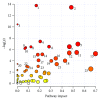Application of Metabolomics to Study Effects of Bariatric Surgery
- PMID: 29713650
- PMCID: PMC5866882
- DOI: 10.1155/2018/6270875
Application of Metabolomics to Study Effects of Bariatric Surgery
Abstract
Bariatric surgery was born in the 1950s at the University of Minnesota. From this time, it continues to evolve and, by the same token, gives new or better possibilities to treat not only obesity but also associated comorbidities. Metabolomics is also a relatively young science discipline, and similarly, it shows great potential for the comprehensive study of the dynamic alterations of the metabolome. It has been widely used in medicine, biology studies, biomarker discovery, and prognostic evaluations. Currently, several dozen metabolomics studies were performed to study the effects of bariatric surgery. LC-MS and NMR are the most frequently used techniques to study main effects of RYGB or SG. Research has yield many interesting results involving not only clinical parameters but also molecular modulations. Detected changes pertain to amino acid, lipids, carbohydrates, or gut microbiota alterations. It proves that including bariatric surgery to metabolic surgery is warranted. However, many molecular modulations after those procedures remain unexplained. Therefore, application of metabolomics to study this field seems to be a proper solution. New findings can suggest new directions of surgery technics modifications, contribute to broadening knowledge about obesity and diseases related to it, and perhaps develop nonsurgical methods of treatment in the future.
Figures


Similar articles
-
Short-term changes in the serum metabolome after laparoscopic sleeve gastrectomy and Roux-en-Y gastric bypass.Metabolomics. 2021 Aug 5;17(8):71. doi: 10.1007/s11306-021-01826-y. Metabolomics. 2021. PMID: 34355282
-
Long-Term Effects of Bariatric Surgery on Gut Microbiota Composition and Faecal Metabolome Related to Obesity Remission.Nutrients. 2021 Jul 23;13(8):2519. doi: 10.3390/nu13082519. Nutrients. 2021. PMID: 34444679 Free PMC article.
-
In-and-Out Molecular Changes Linked to the Type 2 Diabetes Remission after Bariatric Surgery: An Influence of Gut Microbes on Mitochondria Metabolism.Int J Mol Sci. 2018 Nov 24;19(12):3744. doi: 10.3390/ijms19123744. Int J Mol Sci. 2018. PMID: 30477251 Free PMC article.
-
THE INTESTINAL MICROBIOME IN PATIENTS UNDERGOING BARIATRIC SURGERY: A SYSTEMATIC REVIEW.Arq Bras Cir Dig. 2022 Dec 19;35:e1707. doi: 10.1590/0102-672020220002e1707. eCollection 2022. Arq Bras Cir Dig. 2022. PMID: 36542005 Free PMC article.
-
[Role and change of the gut microbiota after bariatric surgery].Zhonghua Wei Chang Wai Ke Za Zhi. 2022 Jul 25;25(7):648-653. doi: 10.3760/cma.j.cn441530-20210903-00356. Zhonghua Wei Chang Wai Ke Za Zhi. 2022. PMID: 35844131 Review. Chinese.
Cited by
-
A microbial metabolite remodels the gut-liver axis following bariatric surgery.Cell Host Microbe. 2021 Mar 10;29(3):408-424.e7. doi: 10.1016/j.chom.2020.12.004. Epub 2021 Jan 11. Cell Host Microbe. 2021. PMID: 33434516 Free PMC article.
-
Roux-en-Y gastric bypass surgery alters serum metabolites and fatty acids in patients with morbid obesity.Diabetes Metab Res Rev. 2018 Nov;34(8):e3045. doi: 10.1002/dmrr.3045. Epub 2018 Sep 19. Diabetes Metab Res Rev. 2018. PMID: 30003682 Free PMC article.
-
Short-Term Metabolic Changes and Their Physiological Mediators in the Roux-en-Y Gastric Bypass Bariatric Surgery.Obes Surg. 2024 Feb;34(2):625-634. doi: 10.1007/s11695-023-07042-y. Epub 2024 Jan 9. Obes Surg. 2024. PMID: 38191968 Free PMC article.
-
Metabolic alterations in plasma after laparoscopic sleeve gastrectomy.J Diabetes Investig. 2021 Jan;12(1):123-129. doi: 10.1111/jdi.13328. Epub 2020 Jul 26. J Diabetes Investig. 2021. PMID: 32563200 Free PMC article.
-
Alterations in gastric and gut microbiota following sleeve gastrectomy in high-fat diet-induced obese rats.Sci Rep. 2023 Dec 2;13(1):21294. doi: 10.1038/s41598-023-48718-w. Sci Rep. 2023. PMID: 38042896 Free PMC article.
References
Publication types
MeSH terms
LinkOut - more resources
Full Text Sources
Other Literature Sources
Medical

